




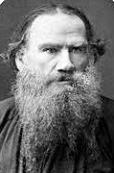






TLW's Russian Novelist Historyscope |
By T.L. Winslow (TLW), the Historyscoper™ |
© Copyright by T.L. Winslow. All Rights Reserved. |
Original Pub. Date: Aug. 13, 2015. Last Update: June 25, 2020. |
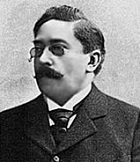


Westerners are not only known as history ignoramuses, but double dumbass history ignoramuses when it comes to Russian novelist history. Since I'm the one-and-only Historyscoper (tm), let me quickly bring you up to speed before you dive into my Master Historyscope.

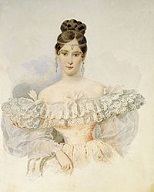
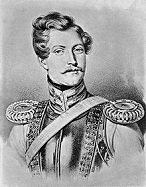
In 1831 Moscow-born #1 Romantic poet-playwright-novelist ("Founder of Modern Russian Literature") ("the Russian Shakespeare") Alexander Sergeyevich Pushkin (1799-1837), great-great-grandson of black Russian Gen. Abram Petrovich Gannibal (1695-1781) pub. his first novel The Belkin Tales (The Tales of the Late Ivan Petrovich Belkin). In 1833 he pub. Eugene Onegin, a verse novel, pioneering the Pushkin Sonnet; bored St. Petersburg dandy Eugene Onegin inherits a landed estate from his uncle and moves to the country, befriending his neighbor, starry-eyed poet Vladimir Lensky, who is engaged to Olga Larina, whose sister Tatyana gets a crush on Onegin and writes him a letter, then meets him to tell him, causing him to deliver Onegin's Sermon rejecting her condescendingly but politely, after which Lensky tries to get them to hook up at a ball, causing him to get even by going after Olga, pissing him off and causing him to challenge Onegin to a duel, only to be killed; after returning to St. Petersburg, he encounters Tatyana married to an old fart general, and falls in love with her, but she rejects him. In 1834 he pub. The Queen of Spades, a short story about human avarice with supernatural elements, which is turned into an opera by Fromental Halevy in 1850, by Franz von Suppe in 1864, and by Peter Tchaikovsky in 1890, and filmed in 1949 by Thorold Dickinson; German Russian army engineer Hermann is told a story by Tomsky about his grandmother, who learned the secret of the three winning cards from the Count of St. Germain, and pulls a pistol on her to make her tell him, causing her to die of fright, after which she opens her eyes in the coffin and names the cards as three, seven, and ace, but warns him only to play once each night; too bad, he goes to Chekalinsky's salon, and bets on the Queen of Spades rather than the ace, losing everything, after which the Queen winks at him, causing him to go mad and get committed to Room 17 of the Obukhov Insane Asylum, forever mumbling "Three, seven, ace!" In 1836 he pub. The Captain's Daughter, about Pugachev's Rebellion of 1773-5. In Nov. Russian poet Alexander Pushkin receives a letter naming him to the Most Serene Order of Cuckolds, pissing him off and causing him to seek a duel with the wife-stealer, who turns out to be his brother-in-law Baron Georges-Charles de Heeckeren d'Anthes (d'Anthès) (1812-95) AKA Dantes-Gekkern, a French officer of the Chevalier Guard Regiment who seduced his wife Natalia Nikolayevna Pushkina (Pushkina-Lanskaya) (nee Goncharova) (1812-63), who kills him on Jan. 27, 1837, is imprisoned in Peter and Paul Fortress in St. Petersburg, pardoned by Tsar Nicholas I, and exiled, ending up in France, where he becomes a senator in the Nat. Constituent Assembly in 1852-70; in 1844 Natalia marries Maj.-Gen. Petr Petrovich Lanskoy (1799-1877). On Feb. 10, 1837 Pushkin is killed in St. Petersburg in his 29th duel by his brother-in-law Baron Georges-Charles de Heeckeren d'Anthes AKA Dantes-Gekkern, a French officer of the Chevalier Guard Regiment who seduced his wife Natalia Pushkina, leaving the unfinished novels Peter the Great's Negro, Rosavlev, and Dubrovsky - the good die young?


In 1831-2 Poltava, Ukraine-born Nikolai Vasilevich Gogol (1809-52) (whose portrait bears a striking resemblance to Hollywood actor Johnny Depp (1963-)?) pub. Evenings in a Farm near Dikanka (stories), making him an instant star. In 1835 he pub. Mirgorod (2 vols.) (short stories), which contains the story Taras Bulba, about a 16th cent. Cossack revolting against the Poles, which is so popular that he expands it into a novel pub. in 1842. In 1835 he pub. Arabesques (short stories), incl. Diary of a Madman. In 1835-6 he pub. the short story The Nose, about Maj. Kovalyov, whose nose detaches and attains the higher rank of state councillor. In 8942 he pub. the short story The Nose, about Maj. Kovalyov, whose nose detaches and attains the higher rank of state council. In 1842 he pub. the short story The Overcoat, about a poor Russian official who scrapes and saves to buy a new overcoat, only to have it stolen, becoming the #1 Russian short story of all time? In 1842 he pub. the picaruesque Dead Souls (Chichikov's Journey), Pt. 1, based on Miguel Cervantes' "Don Quixote"; collegiate councilor Pavel Ivanovich Chichikov buys the titles to dead serfs from their owners to raise loans with them as security; creates a new generation of Russian writers; intended as part 1 of a trilogy; too bad, 10 days before his death he destroys the ms. for Pt. 2 in a fit of hypochondriac melancholy?

On Jan. 15, 1846 Moscow-born Fyodor Mikhailovich Dostoyevsky (Dostoevsky) (1821-81) pub. his first novel Poor Folk, which becomes a big hit, giving him instant fame; Russia's first social novel?; cousins Varvara Dobroselova and Makar Devushkin live across the street from each other in poor peoples' apts., and begin exchanging letters; too bad, his next several novels are duds. In 1864 he pub. Notes from Underground; English tr. pub. in 1918; one of the first works of existentialist lit.; memoirs of a bitter isolated (psychological and spiritual misfit) retired civil servant in St. Petersburg, who hates materialistic Western philosophy esp. Nikolay Chernyshevsky's "What Is to Be Done?" (1863) (a big hit with Lenin); pt. 2 is titled "Apropos of the Wet Snow"; first of a string of hits; "You can say anything about world history... except one thing... It cannot be said that world history is reasonable." In 1866 he pub. Crime and Punishment; written to pay off his gambling debts; St. Petersburg student Rodion Romanovich Raskolnikov (Russ. "raskolnik" = schismatic) thinks he's a genius and wants to be the next Napoleon, proving it by killing greedy hated female pawnbroker Alyona Ivanovna with an axe, after which he breaks down and confesses to pious ho Sonia Semyonovna Marmeladova and police Lt. Ilya Petrovich, and is exiled to Siberia with his teenie daughter Sonia. In 1868-9 he pub. The Idiot, about 26-y.-o. Prince Lev Nikolayevich Myshkin, who returns to Russia after several years in a Swiss sanatorium, getting scorned by St. Petersburg society and ultimately proving that a sanatorium is the only place for a saint? In 1872 he pub. The Demons (Possessed); written to counter the nihilism gripping Russia; narrated by Anton Lavrentyevich G., about Pyotr Stepanovich Verkhovensky (based on Sergey Nechayev), who starts a socialist rev. in a provincial town that descends into horros, while mysterious aristocrat Nikolai Stavrogin fights for morality; Pyotr's father Stepan (Stavrogin's teacher) represents the idealistic Western-loving 1840s generation. In Nov. 1880 he pub. his last novel The Brothers Karamazov; intended it to be part 1 of "The Life of a Great Sinner"; about the struggle to hang onto God in the face of modern reason; daddy Fyodor Pavlovich and sons Dmitri (debauched), Ivan "Vanya" (rationalist), Alyosha (monk), Pavel Fyodorovich Smerdyakov (illegitimate son of Stinking Lizaveta); jezebel Agrafena Alexandrovna Svetlova AKA Grushenka; Dmitri's fiancee Katerina "Katya" Ivanovna Verkhovtseva; Father Zosima the Elder; schoolboy Ilyusha; Book 5 "Pro and Contra" contains the chapter "The Grand Inquisitor".

In 1847 after Fyodor Dostoyevsky praises it in an Apr. 1, 1846 letter, Simbirsk-born Ivan Alexandrovich Goncharov (1812-91) pub. his first novel A Common Story, about young Russian nobleman Aleksander Aduev, who arrives in St. Petersburg from the provinces and loses his romanticism amid the pragmatic commercialism, becoming a big hit esp. in St. Petersburg, gaining praise from critic Vissarion Belinsky, with critic Vasily Botkin issuing the soundbyte: "How much good it will bring to our society, what a massive blow will it administer to romanticism, dreaminess, sentimentality and provincialism." In 1859 after taking 10 years to write it, he pub. Oblomov, about a lazy provincial landed proprietor (a superfluous man), who takes 50 pages to move from his bed to a chair, causing the term "Oblomovism" to enter the Russian language to denote habitual laziness. In 1869 after taking 20 years to write it, he pub. The Precipice, about a romantic rivalry among three men in a household presided over by a tyrannical godmother with a heart of gold, condemning nihilism and defending the religious and moral values of old Russia; after this he spends the last 20 years of his life stewing over the negative reviews? In 1875-6 he writes the memoir An Uncommon Story (pub. 1924), which accuses Ivan Turgenev of stealing his ideas, wishing it to be pub. after his death only if his estate is accused of plagiarism for "historians of Russian literature".

In 1850 Orel (Oryol)-born Ivan Sergeyevich Turgenev (1818-83) pub. The Diary of a Superfluous Man, about a man who has only a few days left to live, becoming the model for Russian lit. char. of the Superfluous man. In 1852 he pub. A Sportsman's Sketches (The Hunting Sketches) (Sketches from a Hunter's Album), his first hit, helping to launch Russian realism; too bad, he is put under house arrest, but helps the movement to abolish Russian serfdom. In 1856 he pub. Rudin, about another superfluous man. In Jan. 1859 he pub. Home of the Gentry (A House of Gentlefolk) (A Nest of Gentlefolk), his biggest hit; nobleman Fyodor Ivanych Lavretsky goes to the univ. in Moscow, and falls for Varvara Pavlovna, marrying her then moving to Paris, where she hooks up with a salon visitor, causing him to abandon her and return to Russia, where he hooks up with his cousin Liza, and is about to marry her when Varvara shows up asking for money, causing Liza to run away to a convent. In 1862 he pub. the novel Fathers and Sons; his masterpiece?; Arkady Kirsanov returns from the U. of Petersburg a nihilist, taking his friend Bazarov with him to his father Nikolai's country estate called Marino, pissing-off Nikolai's brother Pavel.



In Nov. 1852 Yasnaya Polyana-born Count Leo (Lev) Nikolaevich (Nikolayevich) Tolstoy (Tolstoi) (1828-1910) pub. his first novel Childhood under the alias L.N.; an autobio. novel about young Nikolenka, making him a lit. celeb; one of the first expressionistic books in Russian; followed by "Boyhood" (1854), "Youth" (1856); "Will the freshness, lightheartedness, the need for love, and strength of faith which you have in childhood ever return? What better time than when the two best virtues - innocent joy and the boundless desire for love - were the only motives in life?" In 1862 he marries 18-y.-o. Sofia Andreyevna Behrs (1844-1919), and begins work on The Decembrists, a long novel of which only the first three chapters are pub., but the research for it leads him to the 1812 Napoleonic invasion and hence to his really big novel "War and Peace". In 1863 he pub. The Cossacks (Young Manhood), an autbio. novel based on his experience in the Caucasian War of 1817-64, about young nobleman Dmitri Olenin, who ditches aristocratic society to move in with the Cossacks, and falls in love with Maryanka despite having fiance Lukashka. In 1869 he pub. War and Peace (original title "All's Well That Ends Well"); 460K words; first draft completed in 1863 and pub. in 1865-7 under the title "1805", then rewritten in 1866-9; 4 vols., 15 parts, and two epilogues on the Napoleonic Wars (1805-13) for insomniacs, incl. a great description of the 1812 Battle of Borodino; Russian aristocrats speak mainly in French; the five aristocratic families of the Bezukhovs (Pierre), Bolkonskys (Prince Andrei, Lise, Mary), Rostovs (Count Ilya and Countess Natalya, Natasha, Nicholas, Sonya, Petya, Vera), Kuragins (Vasili, Anatole, Helene, Hippolyte) (whose St. Petersburg party opens the novel), and Drubetskys (Princess Anna Mikhaylovna, Boris); peasant Platon Karataev; French gen. Napoleon vs. Russian gens. Bagration and Kutuzov; the tsar's advisor Speranski; Napoleon scores a V over Kutuzov at Borodino, after which Pierre spares Napoleon's life in Moscow, then is captured by the French, escapes, and marries dream babe Natasha, who wants him only for his money, after which he is converted by a peasant to living a simple life; "Well, Prince, so Genoa and Lucca are now just family estates of the Bonapartes" (first line); "Life is all, life is God, and to love life means to love God"; "Everything I know, I know only because I love." In 1873-7 Tolstoy pub. the realist novel Anna Karenina after he drops out of college after three years; pub. in installments in 1873-7 in the Russian Messenger; "flaweless as a work of art" (Tolstoy); "the best [novel] ever written" (William Faulkner); "greatest novel ever written" (Time mag.); "All happy families are alike; each unhappy family is unhappy in its own way" (opening line); known for its motif of the moving train; married Princess Anna Arkadyevna Karenina, inspired by Alexander Pushkin's elder daughter Maria Hartung (Gartung) (1832-1919) married to old fart govt. official Alexei Alexandrovich Karenin while doing it with horse-loving cavalry officer Count Alexei Kirillovich Vronsky, who falls off mare Frou-Frou's saddle, and the racehorse breaks her back and has to be shot, causing Anna to confess her affair to her hubby, later committing suicide by throwing herself in front of a train; at the beginning her brother Prince Stepan "Stiva" Arkadyevich Oblonsky is unfaithful to his wife Princess Darya "Dolly" Alexandrovna, and his treatment is far more gentle than hers later. In the 1870s he undergoes a spiritual awakening, going on to pub. A Confession (1882) about his midlife existential crisis and religious awakening, founding the Sermon on the Mount-living Tolstoyan Movement, causing his wife to freak when he announces that he's giving away all his wealth. In 1886 he pub. The Death of Ivan Ilyich; an official of the court of justice falls and hurts his side, becoming a terminal invalid comforted only by his peasant boy servant Gerasim, reflecting on his worthless social-climbing life. Two weeks before his Nov. 20, 1910 death Tolstoy deserts his wife Sofia, taking daughter Alexander, and at Astapovo railroad station; luckily, after his death the Russian Senate ignores the Tolstoyians and gives his copyrights to Sofia, as portrayed in the 2009 film The Last Station.

In 1863 Saratov-born Russian materialist socialist philosopher Nikolai Chernyshevsky (1828-89) pub. the novel What Is to Be Done?, written in Peter and Paul Fortress in St. Petersburg as a response to Ivan Turgenev's "Fathers and Sons" (1862), expounding the way a true revolutionary should act through the character of Rakhmetov, a totally-dedicated disciplined ascetic, who sleeps on a bed of nails and eats raw steak, becoming a Soviet Union classic after Lenin becomes a fan; pisses-off Fyodor Dostoyevsky, who writes "Notes from the Underground" (1864) in reaction; too bad, Chernyshevsky goes from bad to worse, receiving a mock execution in 1862, penal servitude in 1864-72, and exile to Vilyuisk, Siberia in 1872-83.

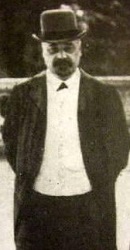
In 1876 Russian historical novelist Vsevolod Sergeyevich Solovyov (1849-1903) son of historian Sergei Solovyov and brother of philosopher Vladimir Solovyov pub. his first novel Princess Ostrozhsakaya. In 1884 after seducing his wife's 13-y.o. sister Yuliana Dmitrievna "Justine" Glinka (1844-1918) in 1857, and getting her pregnant, he flees to Paris and hooks up with Theosophy founder Madame Blavatsky, but breaks with her in 1886, denouncing her as a failed spy for the Okhrana; meanwhile Glinka moves to Paris and also hooks up with Blavatsky, becoming a secret agent of Okhrana chief in Paris (1885-1902) Pyotr Ivanovich Rachkovsky (1853-1910), allegedly delivering the infamous "Protocols of the Elders of Zion" to him. In 1889 he pub. The Magi, followed in 1890 by The Great Rosicrucian.

In 1921 Lebedyan, Russia-born novelist Yevgeny Ivanovich Zamyatin (1884-1937) pub. We, the diary of D-503 of the no-privacy glass-city One State and his babe I-330, who hooks him up with the resistance group Mephi; forerunner of George Orwell's "Animal Farm" and "1984".

In Nov. 1962 Kislovodsk-born Alexander (Aleksandr) Solzhenitsyn (1918-2008) pub. One Day in the Life of Ivan Denisovich after Soviet PM Khrushchev directs the literary mag. Novy Mir to pub. it, giving him internat. fame after he had been an inmate in Stalin's labor camps for eight years; about Soviet labor camp inmate Ivan Denisovich Shukhov in the 1950s; in 1966 the Soviet Union bans all his works; in 1969 leftist writer Lillian Hellman (1905-84) tells Dorothea Strauss, wife of publisher Roger W. Straus that he is a "malefactor" for pub. Solzhenitsyn's work, with the soundbyte: "If you knew what I know about American prisons, you would be a Stalinist too". In 1968 he pub. In the First Circle; a sharashka (R&D bureau made up of gulag inmates) in the Moscow suburbs; based on Dante's concentric circles of Hell. In 1968 he pub. Cancer Ward, about cancerous POW Oleg Kostoglotov, who finds love with nurse Zoya in Ward 13 of a hospital in Soviet Kazakhstan in 1955 that discharges patients before they die to save rubles - the original Obamacare? In 1971 he pub. August 1914 (English trans. pub. in 1972), about how the big D in the 1914 Battle of Tannenburg caused Russia to go into the downhill slide towards Communism, from the POV of Col. Vorotyntsev. On Dec. 28, 1973 he pub. The Gulag Archipelago, 1918-1956 (3 vols.); written in 1958-68; English trans. pub. in 1974; denounces the Soviet penal system as oh what a poor show, helping to bring Soviet Communism down like a slow poison?